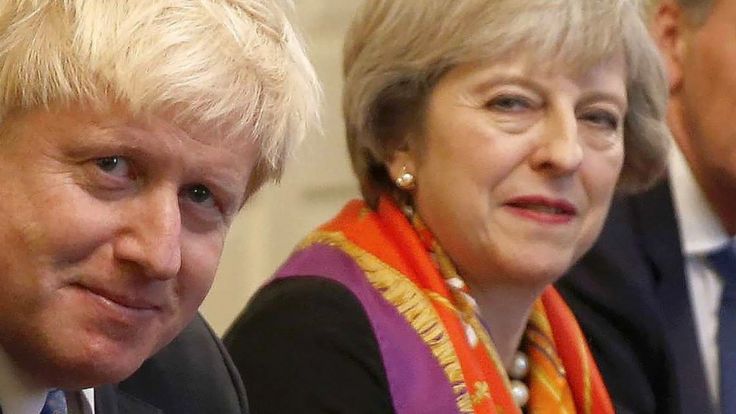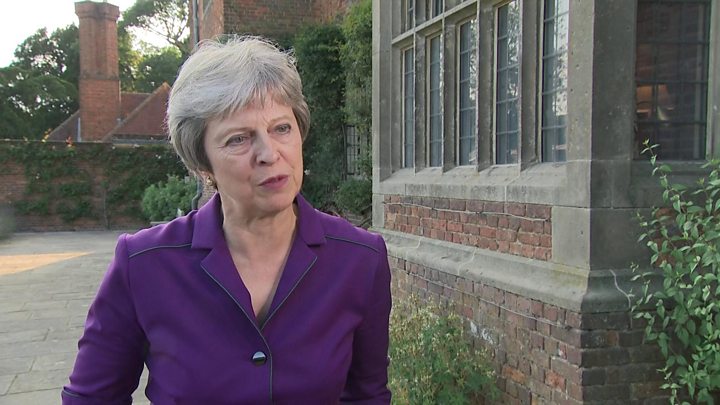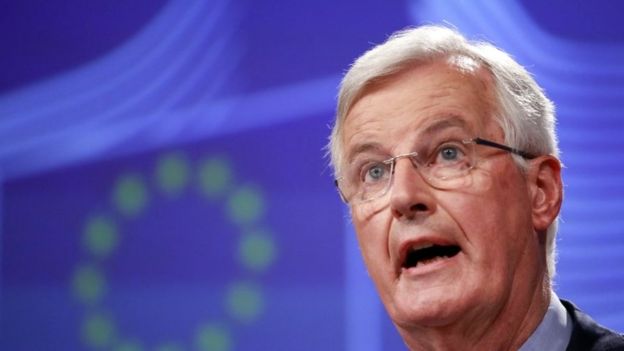Boris 'I Didn't Say Anything' Johnson
“I didn’t say anything about Turkey in the referendum.”— Channel 4 News (@Channel4News) January 18, 2019
Boris Johnson denies making claims about Turkey entering the EU during the Vote Leave campaign - even though Channel 4 News’ @FactCheck has found evidence to the contrary. pic.twitter.com/jsVjxztK7g
Channel 4's Michael Crick makes arch-Brexiteer Boris Johnson look like a two-faced chump over remarks he made about about Turkey during the EU referendum.
No wonder we need a People's Vote on the final terms of any Brexit Deal or No Deal - with complete hypocrites like Boris helping to run the country.
People's Vote on Brexit (06/09/18)

The latest opinion poll suggests that the public mood has changed over Brexit with 59% of voters backing Remain and only 41% Leave.
Now if Boris Johnson can change his mind over the Chequers Plan and what Brexit actually means, why can’t the voters have the final say over any Brexit deal?
The support for Remain amongst Labour Party members is even more pronounced, by the way, with more than 70% in favour of staying in the European Union.
The poll, by the way, was conducted by Professor John Curtice at Strathclyde University's national centre for social research.
Message for Corbyn - STOP BACKING BREXIT! (17/06/18)
A group of enterprising young Labour supporters had a message for Jeremy Corbyn at yesterday's 'Labour Live' event in London - STOP BACKING BREXIT!
For having the temerity to speak out and echo the views the vast majority of Labour Party members the young protesters were asked to leave the event even though they must had paid for their tickets to be there in the first place.
Whatever happened to peaceful and good natured protest inside the Labour Party?
Maybe it's gone the same way as Labour Party democracy over Brexit because the vast majority of members support staying in the Single Market and the Customs Union - as well as having a popular vote on the final terms of any proposed Brexit deal.
For having the temerity to speak out and echo the views the vast majority of Labour Party members the young protesters were asked to leave the event even though they must had paid for their tickets to be there in the first place.
Whatever happened to peaceful and good natured protest inside the Labour Party?
Maybe it's gone the same way as Labour Party democracy over Brexit because the vast majority of members support staying in the Single Market and the Customs Union - as well as having a popular vote on the final terms of any proposed Brexit deal.
People's Vote on Brexit (04/09/18)
Boris Johnson famously welcomed the Prime Minister's proposed 'Chequers plan' for Brexit and even proposed a toast to Theresa May before abruptly changing his mind and resigning from the Government a few days later.
Yet now the former foreign secretary has gone completely into reverse and says that the UK will get 'diddly squat' from Theresa May's Brexit plans.
But if Bojo can change his mind on what Brexit means in such a short space of time, surely the UK voters should have the final say through a People's Vote on the final terms of any Brexit?
The BBC has a full report via the following link.
Boris Johnson: UK gets 'diddly squat' from May's Brexit plans

Image copyright - AFP/GETTY IMAGES Image caption - Boris Johnson has spoken out against Theresa May's plans for Brexit in a newspaper column
Boris Johnson has savaged Theresa May's Brexit plans, saying they would leave the UK with "diddly squat" after the negotiations and hand the EU "victory".
The ex-foreign secretary used his Daily Telegraph column to say the Chequers deal "means disaster" for Britain.
Downing Street hit back, saying his article contained "no new ideas" and that "serious leadership with a serious plan" was needed.
It comes after the EU's negotiator criticised the UK's proposals.
The so-called Chequers deal was agreed by cabinet at the prime minister's country residence as the UK's preferred way forward in negotiations with Brussels.
Boris Johnson has savaged Theresa May's Brexit plans, saying they would leave the UK with "diddly squat" after the negotiations and hand the EU "victory".
The ex-foreign secretary used his Daily Telegraph column to say the Chequers deal "means disaster" for Britain.
Downing Street hit back, saying his article contained "no new ideas" and that "serious leadership with a serious plan" was needed.
It comes after the EU's negotiator criticised the UK's proposals.
The so-called Chequers deal was agreed by cabinet at the prime minister's country residence as the UK's preferred way forward in negotiations with Brussels.
EU 'strongly opposed' to PM's Brexit plan
The Chequers plan explained
Brexit: All you need to know
At-a-glance: The UK's four Brexit options
Mrs May's plan would see the UK agreeing a "common rulebook" with the EU for trading in goods, in an attempt to maintain frictionless trade at the border.
It also officially ends the jurisdiction of the European Court of Justice in the UK, but the ECJ would continue to be "the interpreter of EU rules" that the UK has agreed to stick to.
Critics say the deal will leave the UK tied to EU rules and prevent Britain from striking its own trade deals in years to come. The UK is due to leave the EU on 29 March.
The negotiations between the UK and EU have an informal deadline tied to a summit in October - although figures on both sides have said it could slip back to November.
If the UK and the EU do reach a deal, MPs will then have to approve it - and BBC political editor Laura Kuenssberg described what happens if they reject it as a "great unknown".
"Nobody can answer that question because it simply has not happened before," she added.
In his first intervention on the EU debate since quitting the government, Mr Johnson compared negotiations between Brexit Secretary Dominic Raab and Mr Barnier to a wrestling match.
He wrote: "The whole thing is about as pre-ordained as a bout between Giant Haystacks and Big Daddy; and in this case, I am afraid, the inevitable outcome is a victory for the EU, with the UK lying flat on the canvas and 12 stars circling symbolically over our semi-conscious head."
Mr Johnson said negotiations based on the Chequers plan had so far seen the EU take "every important trick", adding: "The UK has agreed to hand over £40bn of taxpayers' money for two-thirds of diddly squat."
He said by using the strategy - defended by Mrs May in the Sunday Telegraph over the weekend - the UK had "gone into battle with the white flag fluttering over our leading tank".
If it continued on the same path, Mr Johnson added, the government would "throw away most of the advantages of Brexit".
Mr Johnson also accused some members of the government of using the issue of the border between Ireland and Northern Ireland to "stop a proper Brexit", but added: "They have been rumbled."
The "scandal" around the border problem was "not that we have failed, but that we have not even tried", he added.
Mr Johnson argued that a hard border would not be needed after Brexit - because people did not need to be checked due to the Common Travel Area and that any checks on goods could be done away from the border.
In response, Mrs May's official spokesman said: "Boris Johnson resigned over Chequers. There's no new ideas in this article to respond to.
"What we need at this time is serious leadership with a serious plan and that's exactly what the country has with this prime minister and this Brexit plan.
"She is a serious prime minister and she has put forward serious proposals."
Labour's Brexit spokesman Sir Keir Starmer tweeted: "Typical Johnson. False promises. Then refusal to take responsibility for his own actions. It's always someone else's fault."
The Chequers plan explained
Brexit: All you need to know
At-a-glance: The UK's four Brexit options
Mrs May's plan would see the UK agreeing a "common rulebook" with the EU for trading in goods, in an attempt to maintain frictionless trade at the border.
It also officially ends the jurisdiction of the European Court of Justice in the UK, but the ECJ would continue to be "the interpreter of EU rules" that the UK has agreed to stick to.
Critics say the deal will leave the UK tied to EU rules and prevent Britain from striking its own trade deals in years to come. The UK is due to leave the EU on 29 March.
The negotiations between the UK and EU have an informal deadline tied to a summit in October - although figures on both sides have said it could slip back to November.
If the UK and the EU do reach a deal, MPs will then have to approve it - and BBC political editor Laura Kuenssberg described what happens if they reject it as a "great unknown".
"Nobody can answer that question because it simply has not happened before," she added.
In his first intervention on the EU debate since quitting the government, Mr Johnson compared negotiations between Brexit Secretary Dominic Raab and Mr Barnier to a wrestling match.
He wrote: "The whole thing is about as pre-ordained as a bout between Giant Haystacks and Big Daddy; and in this case, I am afraid, the inevitable outcome is a victory for the EU, with the UK lying flat on the canvas and 12 stars circling symbolically over our semi-conscious head."
Mr Johnson said negotiations based on the Chequers plan had so far seen the EU take "every important trick", adding: "The UK has agreed to hand over £40bn of taxpayers' money for two-thirds of diddly squat."
He said by using the strategy - defended by Mrs May in the Sunday Telegraph over the weekend - the UK had "gone into battle with the white flag fluttering over our leading tank".
If it continued on the same path, Mr Johnson added, the government would "throw away most of the advantages of Brexit".
Mr Johnson also accused some members of the government of using the issue of the border between Ireland and Northern Ireland to "stop a proper Brexit", but added: "They have been rumbled."
The "scandal" around the border problem was "not that we have failed, but that we have not even tried", he added.
Mr Johnson argued that a hard border would not be needed after Brexit - because people did not need to be checked due to the Common Travel Area and that any checks on goods could be done away from the border.
In response, Mrs May's official spokesman said: "Boris Johnson resigned over Chequers. There's no new ideas in this article to respond to.
"What we need at this time is serious leadership with a serious plan and that's exactly what the country has with this prime minister and this Brexit plan.
"She is a serious prime minister and she has put forward serious proposals."
Labour's Brexit spokesman Sir Keir Starmer tweeted: "Typical Johnson. False promises. Then refusal to take responsibility for his own actions. It's always someone else's fault."

Media caption - Theresa May speaks after 12-hour cabinet meeting at Chequers in July
Meanwhile, in an interview with the German newspaper Frankfurter Allgemeine Zeitung, EU chief negotiator Michel Barnier criticised the Chequers deal, saying to agree to it would see "the end of the single market and the European project".
He said plans for a "common rulebook" for goods but not services were not in the EU's interests, adding: "Our own ecosystem has grown over decades. You cannot play with it by picking pieces."
"The British have a choice," he said. "They could stay in the single market, like Norway, which is also not a member of the EU - but they would then have to take over all the associated rules and contributions to European solidarity. It is your choice.
"But if we let the British pick the raisins out of our rules, that would have serious consequences.
"Then all sorts of other third[-party] countries could insist that we offer them the same benefits."

Image copyright - EPA Image caption - Michel Barnier has previously expressed criticism about Mrs May's Chequers plan
Speaking on BBC Radio 4's Today programme, one of Mrs May's allies, former First Secretary of State Damian Green, said it would be "difficult but not impossible" for the Chequers plan to win the support of MPs in the House of Commons.
He said it was "absolutely certain" there was no Parliamentary majority for a so-called "hard Brexit" and challenged supporters of that option to come up with a proposal that could win the support of the House of Commons.
Former Brexit Secretary David Davis, who resigned in protest at the Chequers plan, told ITV's Good Morning Britain Mrs May should not be replaced, because "we don't need any more turbulence right now".
"What matters in all of this is not the personality politics, it's the outcome at the end," he added.
Responding to Mr Barnier's remarks, a government spokeswoman said of Chequers: "This proposal achieves a new balance of rights and obligations that fulfils our joint ambition to establish a deep and special partnership once the UK has left the EU while preserving the constitutional integrity of the UK. There is no other proposal that does that.
"Our negotiating teams have upped the intensity, and we continue to move at pace to reach - as Mr Barnier says - an ambitious partnership, which will work in the mutual interests of citizens and businesses in the UK and in the EU."
On Sunday, Mrs May wrote that she was "confident" a "good deal" could be reached on Brexit.
But she said it was right for the government to prepare for a no-deal scenario - even though this would create "real challenges for both the UK and the EU" in some sectors.
Speaking on BBC Radio 4's Today programme, one of Mrs May's allies, former First Secretary of State Damian Green, said it would be "difficult but not impossible" for the Chequers plan to win the support of MPs in the House of Commons.
He said it was "absolutely certain" there was no Parliamentary majority for a so-called "hard Brexit" and challenged supporters of that option to come up with a proposal that could win the support of the House of Commons.
Former Brexit Secretary David Davis, who resigned in protest at the Chequers plan, told ITV's Good Morning Britain Mrs May should not be replaced, because "we don't need any more turbulence right now".
"What matters in all of this is not the personality politics, it's the outcome at the end," he added.
Responding to Mr Barnier's remarks, a government spokeswoman said of Chequers: "This proposal achieves a new balance of rights and obligations that fulfils our joint ambition to establish a deep and special partnership once the UK has left the EU while preserving the constitutional integrity of the UK. There is no other proposal that does that.
"Our negotiating teams have upped the intensity, and we continue to move at pace to reach - as Mr Barnier says - an ambitious partnership, which will work in the mutual interests of citizens and businesses in the UK and in the EU."
On Sunday, Mrs May wrote that she was "confident" a "good deal" could be reached on Brexit.
But she said it was right for the government to prepare for a no-deal scenario - even though this would create "real challenges for both the UK and the EU" in some sectors.



